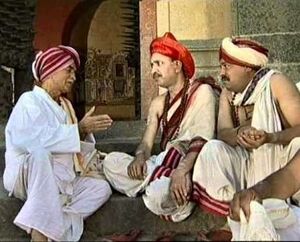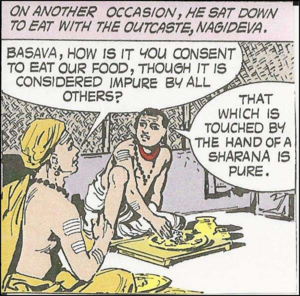Talk:Samatvaṃ - Does not Discriminate against Anyone
By Vishal Agarwal
The true Bhakti Yogī treats everyone with fairness and justice, equally and with respect irrespective of who they are and what they are. Among them (the Bhakta-s), there is no distinction based on caste, learning, beauty, family lineage, wealth, profession and the rest. This is because they are all His own. Nārada Bhakti Sūtra 72-73
Sant Eknath Restores an Abandoned Infant to his Mother
One day, Eknath was taking a bath in the river Godavari when he saw a poor woman arrive with her infant and a bucket to fill some water. After she had filled her bucket with the water, she started walking back towards her home alone, and forgetting to carry the infant. The baby soon started crying and caught Ekanth’s attention. He rushed to the baby and picked him loving in his arms. He followed the woman and then gave the baby to her as she was just entering her home. The mother realized her absent-mindedness, and cried with joy to see her baby back in her arms. She thanked Eknath for returning her child to her. When the news of this incident spread in the village, several Brahmanas got very upset. They approached him and said, “Ekanath, you are a Brahmana. Then how come you picked up the child of an untouchable and even went to their home? We think that you have committed a sin and therefore you must bathe 108 times in the Godavari to purify yourself.” Ekanath was shocked and he said, “How can you be so heartless? The child was crying and it was my duty pick him up and take him to his mother.” But the Brahmanas would not listen to Ekanath and an argument started.
Just then, a leper arrived and said, “I am coming from the temple of Vithoba in Pandharpur. When I worshipped Vithoba (Krishna) to cure my disease, he asked me to come to your village in search of a Sant hands, and recited the name of Vishnu with great devotion. Then he sprinkled the water on the leper.
And lo, a miracle happened! The leper got cured in front of everyone’s eyes. The narrow minded Brahmanas were now ashamed. They had thought that Eknath had committed a sin by helping an untouchable family. But clearly in the eyes of Krishna, Eknath had done a very good Karm by doing so[1].
Bāsaveshvara Teaches the Equality of all Bhaktas
Basava taught that everyone was equal, and it was wrong to look down upon some people because they were born in a so called low-caste. He asked all his followers to carry a small Shiva-linga that they hung from their necks and worshipped daily. Everyone used the same ceremonies to worship Bhagavān Shiva. He taught that it is better to be a good person, and give up evils like anger and greed than show off by performing expensive Poojas. His main teaching was that it is love for Shiva and pure character that make us great, not wealth or birth in a powerful family.
In those days, there was a community of people called ‘untouchables’ with whom other people did not eat or live, or married their children to. Basava asked people to stop practicing these discriminatory rules. Not only did he eat with the ‘untouchables’ himself, but he also asked his followers belonging to different castes to marry their children to each other. One day, King Bijjala received the complaint that Basava, a Brahmin, had eaten at the home of an untouchable Sharana (a Sadhu devoted to Shiva). Basava appeared with the Sadhu in the court and said, “The same blood flows through the body of an untouchable as well as the Brahmin. I believe that all human beings are equal. This Sadhu is a great bhakta of Shiva, and therefore he is better than the so called Brahmins who do not have any love for Bhagavān.” Basava’s critic then taunted him and said, “Are you saying that this untouchable is superior to us Brahmins? In that case, does milk flow through his veins, and merely blood in our veins?” Basava immediately took out his sword, and cut the top of the finger of the Sadhu.
Everyone was surprised to see milk coming out of the untouchable Sadhu’s cut finger. Seeing the miracle, they became quite and had no choice but to agree that the untouchable Sadhu was a holy man due to his devotion to Shiva.
References[edit]
- ↑ Krishnamani, M. N. Godly Men and Their Golden Words. Rashtriya Sanskrit Sansthan, 1998, pp. 154–155.


